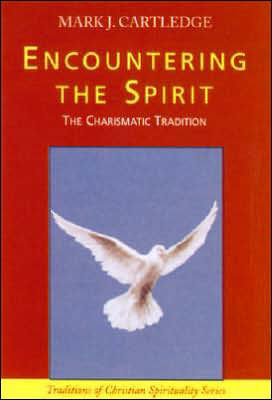
|
Posted March 13, 2007
Book: Encountering the Spirit: The Charismatic Tradition Author: Mark J. Cartledge Orbis Books. Maryknoll. New York. 2007. Pp. 152 An Excerpt from the Jacket: There are an estimated 500 million “pentecostal” or charismatic Christians, often belonging to relatively new churches, and they make up the most vibrant and fastest-growing communities in the world. Yet as Mark Cartledge shows, charismatic spirituality has been a feature of Christianity from the earliest days, even if aspects of it have often been marginalized and ignored. His masterly introductory survey, ideal for both the general reader and the student, traces the movement back to the Bible and the work of Tertullian, to Montanism, Simeon and the New Theologian, Joachim of Fiore, John Wesley, and recent charismatic and neo-charismatic renewal sources. An Excerpt from the Book:
The person who is regarded as the greatest philosopher and theologian of this period in the Western Church is Thomas Aquinas (ca 1225-74). In the Augustinian tradition he regarded the Spirit as the bond of love within the Godhead and held that this love is placed within us by his grace. The indwelling Spirit forgives sins and justifies, so that the recipient participates in the divine life and is adopted as God’s child. Spiritual habits enable Christians to perform supernatural works and express the virtues of faith, hope and love. The seven-fold supernatural endowments of the Spirit also enable a disposition towards the good in a stable ongoing fashion (Isa. 11:2-3). The fruit of the Spirit (Gal. 5:22-3) are also acts of virtue and actions in which humans can delight. Indeed, the summit of the spiritual life is characterized by the beatitudes (Matt. 5:3-10) and these are brought about by the Spirit at work in the human soul. Although the gifts of the Holy Spirit are habits of grace, the charismatic or extraordinary gifts are understood as transitory. The former is directed towards the sanctification of the individual, while the latter is for the good of others. The charismatic graces are categorized as prophecy, speech and action. Prophecy can include all the other gifts of knowledge, speech includes tongues, interpretation (of all kinds of speech) and utterances of wisdom and knowledge, while the action includes healings and miracles. His early biographers recall how his sermons were accompanied by miracles and that during Mass he frequently experienced ecstasy. His spirituality was expressed in hymns, especially Almum flamen vita Mundi. Table of Contents: 1. Charismatic spirituality 2. The charismatic tradition in church history 3. Praise and worship 4. Inspired speech 5. The sanctified life 6. Empowered kingdom witness 7. The community of interpreters Conclusion |
|
